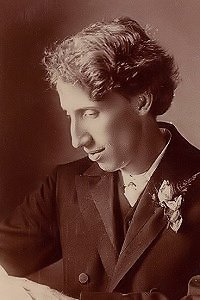Introduction
Born: December 9, 1863, Tetbury, England.
Died: May 16, 1945, London, England.
Cremated: Location of ashes unknown.

Born: December 9, 1863, Tetbury, England.
Died: May 16, 1945, London, England.
Cremated: Location of ashes unknown.

Campbell was the son of Welshman George Morgan, a strict Plymouth Brethren member who resigned and became a Baptist minister, and Elizabeth Fawn Brittan.
He was very sickly as a child, could not attend school, and so was tutored.
When Campbell was 10 years old, Dwight Moody came to England for the first time, and the effect of his ministry, combined with the dedication of his parents, made such an impression on young Morgan that at the age of 13 he preached his first sermon.
Two years later he was preaching regularly in country chapels during his Sundays and holidays.
In 1883 he was teaching in Birmingham, but in 1886, at the age of 23, he left the teaching profession and devoted himself to preaching and Bible exposition.
He was ordained to the Congregational ministry in 1890. He had no formal training for the ministry, but his devotion to studying of the Bible made him one of the leading Bible teachers in his day. His reputation as preacher and Bible expositor grew throughout Britain and spread to America.
In 1896, Moody invited him to lecture to the students at the Moody Bible Institute, Chicago, Illinois. This was the first of his 54 crossings of the Atlantic to preach and teach.
After Moody’s death in 1899, Morgan assumed the position of director of the Northfield Bible Conference. He was ordained by the Congregationalists in London, and given a Doctor of Divinity degree by the Chicago Theological Seminary in 1902.
After five successful years in this capacity, he returned to England in 1904 and became pastor of Westminster Chapel in London. During two years of this ministry, he was president of Cheshunt College in Cambridge.
His preaching and weekly Friday night Bible classes were attended by thousands. In 1910 Morgan contributed an essay titled The Purposes of the Incarnation to the first volume of The Fundamentals, 90 essays which are widely considered to be the foundation of the modern Fundamentalist movement.
Leaving Westminster Chapel in 1919, he once again returned to America, where he conducted an itinerant preaching and teaching ministry for 14 years.
Finally, in 1933, he returned to England, where he again became pastor of Westminster Chapel. He stayed there until retiring in 1943.